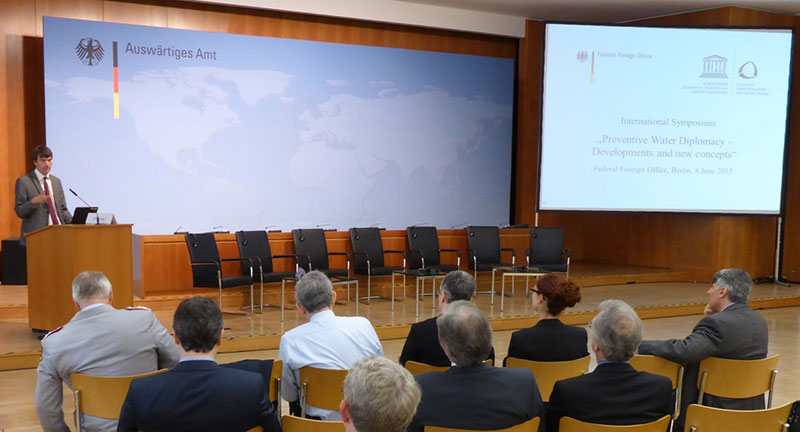International Symposium “Preventive Water Diplomacy – Developments and new Concepts”
Berlin, Germany, 8 June 2015 (IHP-UNESCO, AA, BMUB)

ICWRGC invited relevant experts to the Symposium on “Preventive Water Foreign Policy – Developments and New Concepts” that took place on 8 June 8 2015 in Berlin at the Federal Foreign Office.
More Information
The field of water foreign policy and international water governance is still young, but rapidly evolving. A visible indication of this swift development process is the adoption of the EU Foreign Ministers’ Council Conclusions in July 2013. At the international level, the entry into force of the UN-Watercourses Convention and the global opening of the UN-Economic Commission for Europe Water Convention are further examples worth mentioning. The role of water in the post-2015 Agenda requires a stronger integration of water foreign policy with the agendas of research, technical development and international cooperation, in order to succeed in transforming scientific/technical potentials into experienced evolution.
The Symposium’s objective was to substantiate the tools from the fields of water management and water foreign policy, and to have the political and scientific water community discuss innovative concepts to serve as a basis for elaborating recommendations for action.
Three different initial stages in shared basin cooperation were addressed:
- Conflict resolution, e. g. mediation, good offices, referral to adjudication, negotiation forums, diplomatic statements and diplomatic „pressure“, shuttle diplomacy.
The engagement of conflict resolution specialists to assist in the diagnosis of the broader context of the conflict (often beyond just trans-boundary or riparian water disputes) and the design of an appropriate conflict resolution strategy is an important component of understanding the pre-condition and defining the solution space prior to initiating water diplomacy. - Conflict prevention, e. g. to negotiation forums, confidence building, initiation of joint studies, joint risk assessments and public diplomacy.
More attention to the preventive side of potential conflict can pay dividends: Early warning systems and risk analyses are important, monitoring including early warning aspects should become a basis for decision making. - Cooperation architecture, e. g. initiation of international water treaties, establishment of river basin organisations, notification mechanisms, joint management plans, joint assessment of projects and joint monitoring.
Scientific trans-boundary collaboration (“scientific diplomacy”), such as on sharing water data, developing mutually beneficial monitoring strategies, and/or joint modelling or studies, can help build trust between the riparians and, thus, create a strong basis for cooperation. Prerequisite is the acceptance of political decision makers to share data and proper functioning of hydro-meteorological services which proves difficult, particularly in water-scarce and tensioned basins.
Water diplomacy activities are best approached at multiple levels. This includes bottom-up engagement with a broad range of interests from civil society, such as local and multi-sector representation, the general public, academia, NGOs, financing and donor institutions, and parallel levels of regional and national government officials.
A focus on a fair and reasonable assessment of the beneficial and adverse effects of alternative solutions to a water dispute for all parties, and effective communication is a prerequisite to any successful resolution mediation or arbitration process.
Main results and recommendations:
- Water is in some parts of the world a strategic matter, water diplomacy is linked to geopolitics.
- Water is perceived as national property, sovereignty is an important issue.
- Traditional diplomacy might not be adapted to solving problems of current times (quick and large changes in economy, climate and conflict areas; water becoming more important due to population growth; focus lies on river basins rather than on nations, water /energy flows and a multi-sector basis).
Water diplomacy is frustrating for the actors (Ministries of Foreign Affairs “MoFAs”), subject is poorly understood but MoFAs have convening power. - UN water conventions, river basin commissions and international water treaties should be improved.



